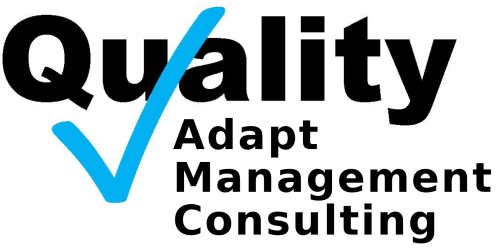An ISO 9001 internal audit in your Cedar Rapids IA company by Adapt Management Consulting is a systematic and independent examination of your organization's Quality Management System (QMS) to determine its compliance with ISO 9001 requirements and the effectiveness of its implementation. Contact us for more information or call: 262-271-7283.
During our time together, these are the steps we go through during an ISO 9001 internal audit:
-
Audit Planning:
- Define the audit scope, objectives, and criteria, including the specific ISO 9001 clauses and processes to be audited.
- Select qualified internal auditors and assign responsibilities.
- Develop an audit plan that outlines the audit schedule, methodology, and resources required.
-
Preparation:
- Review relevant documentation, including the ISO 9001 standard, the organization's QMS documentation (e.g., quality manual, procedures, work instructions), and previous audit reports.
- Familiarize auditors with the organization's QMS, processes, and quality objectives.
-
Opening Meeting:
- Conduct an opening meeting with auditors and representatives from the audited area to explain the purpose and scope of the audit, the audit process, and expected outcomes.
- Establish communication channels for the audit.
-
Document Review:
- Examine QMS documentation to assess its compliance with ISO 9001 requirements. This includes evaluating the organization's policies, procedures, records, and quality objectives.
-
Process Auditing:
- Assess the implementation and effectiveness of QMS processes, including process interactions, inputs, outputs, and performance indicators.
- Verify that processes are being followed as documented and that they achieve the intended results.
-
Interviews and Observations:
- Interview personnel involved in QMS processes to gather information, clarify procedures, and verify adherence to quality requirements.
- Observe processes in action to assess their effectiveness and identify areas for improvement.
-
Evidence Collection:
- Collect objective evidence to support audit findings. This may include documents, records, interview notes, and observation reports.
-
Finding Identification:
- Identify and document audit findings, including any non-conformities (instances where requirements are not met) and areas for improvement. Findings should be specific, clear, and traceable to ISO 9001 clauses or processes.
-
Reporting:
- Prepare an audit report that summarizes the audit process, findings, observations, and conclusions.
- Provide recommendations for corrective actions or improvements and prioritize them based on their significance.
-
Closing Meeting:
- Conduct a closing meeting with auditors and representatives from the audited area to discuss the audit findings, observations, and recommendations.
- Address any questions or concerns raised by the audited area.
-
Corrective Actions:
- Work with the audited area to develop corrective action plans for addressing non-conformities or areas for improvement identified during the audit.
- Ensure that corrective actions are comprehensive, specific, and include timelines for implementation.
-
Follow-Up:
- Conduct follow-up audits or reviews to verify the implementation and effectiveness of corrective actions.
-
Audit Closure:
- Formally close the audit and communicate the final audit report to relevant parties.
-
Continuous Improvement:
- Use the audit findings and recommendations as opportunities for continual improvement in the QMS and QMS processes.
ISO 9001 internal audits are essential for ensuring that the QMS is effective, compliant, and continuously improving. Regular audits help organizations identify areas for enhancement, maintain compliance with ISO 9001 standards, and achieve their quality objectives.
Cedar Rapids, Iowa, is not just a city but a thriving community where businesses can prosper. Its supportive environment, diverse economy, and commitment to innovation create a dynamic landscape for entrepreneurs and established companies alike. With its excellent quality of life and strategic location, Cedar Rapids stands out as a prime location for business success and growth in the heartland of America. Whether starting fresh or looking to expand, Cedar Rapids welcomes you to be part of its vibrant business community.
Cedar Rapids, the second-largest city in Iowa, is a vibrant urban center known for its flourishing business environment, cultural richness, and strong sense of community. With a strategic location and a diverse economy, Cedar Rapids offers a fertile ground for businesses of all sizes. From startups to multinational corporations, the city is buzzing with opportunity.
Economic Diversity and Growth
Cedar Rapids boasts a diverse economy, with strong sectors in manufacturing, technology, finance, and food processing. Renowned companies, including Collins Aerospace and General Mills, have significant operations here, underscoring the city's role as an economic powerhouse. This diversity not only stabilizes the local economy but also provides various opportunities for businesses and professionals.
Supportive Business Environment
The city is known for its supportive business climate. Various local organizations, such as the Cedar Rapids Metro Economic Alliance, provide resources, networking opportunities, and advocacy for businesses. The city also offers incentives for businesses to relocate or expand, including tax credits and grants, reflecting its commitment to economic development and job creation.
Innovation and Technology
Cedar Rapids is on the cutting edge of technology and innovation. The city fosters a culture of innovation through initiatives like the Iowa Startup Accelerator and NewBoCo, which support tech startups and entrepreneurs. This forward-thinking attitude attracts talent and investment, making the city a hotbed for technological advancement and innovative business solutions.
Quality of Life
Businesses in Cedar Rapids benefit from the city's high quality of life. With its affordable living, excellent schools, and myriad cultural and recreational activities, the city is an attractive place for professionals and their families. This vibrant community spirit not only makes Cedar Rapids a great place to live but also aids in attracting and retaining top talent.
Strategic Location
Cedar Rapids' strategic location, with easy access to major highways and the Eastern Iowa Airport, provides businesses with a logistical advantage. The city's central location in the Midwest makes it an ideal hub for manufacturing and distribution, offering easy access to major markets across the United States.


